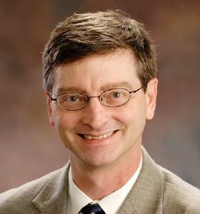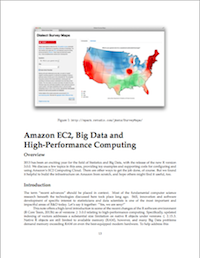SC13 marks the 25th anniversary of the supercomputing conference series. To get a perspective on the history of the show, we caught up with SC13 Conference Chair Bill Gropp.
insideHPC: When you took over as conference chair this year, what were the top things you set out to accomplish? How did it go?
 Bill Gropp: SC is a unique – and uniquely valuable – event in our community, with a long history of making a difference. When I accepted the challenge of chairing the conference, I set the bar high: I wanted to make SC even better than it is already. Some of my most important goals were:
Bill Gropp: SC is a unique – and uniquely valuable – event in our community, with a long history of making a difference. When I accepted the challenge of chairing the conference, I set the bar high: I wanted to make SC even better than it is already. Some of my most important goals were:
- Increase the recognition of the widespread contribution of HPC to all aspects of society
- Make SC the most desirable place to present and publish the best technical work in HPC.
- Make SC an even more effective place for everyone involved in HPC to collaborate and make new connections.
Bill Gropp: So far, I think that it is going well, but you and your readers will have to tell me how well my committee and I have succeeded in making SC even better. And I believe that we’ve made the planning process better; for example, we’ve reduced the number of planning meetings and we’re using collaboration tools to better organize and prepare.
insideHPC: What new things can attendees expect to see this year at SC13?
Bill Gropp: The model that has evolved for the conference is that we have a core of excellent program elements – tutorials, technical papers, the exhibition, and so on – and then we innovate around that core. Each year the committee tries a few new things and, while some don’t work out, those that do work out may ultimately be added to the core of the conference. This helps us ensure that each SC is familiar, but stays fresh and exciting.
This year we’ve added some truly interesting aspects to the program:
- There are more ways to see HPC in action with Emerging technologies and the HPC Impact Showcase, both on the exhibit floor. Emerging technologies is a peer-reviewed addition to the technical program that showcases new developments, permitting the live demonstration of new technologies and ideas. The HPC Impact Showcase highlights the use of HPC, from consumer goods to industrial applications. It provides a venue for the users of HPC to interact with the developers and providers of HPC technology, and will include many large corporations using HPC that I think attendees will find very interesting.
- Looking back over the past 25 years, it is clear that SC has been the launching point for many of the technical innovations that have reshaped HPC. To recognize this history of impact we have started “Test of Time” award, which will be presented for the first time this year. This new award will be presented each year to a paper presented at SC that has had the greatest sustained impact on our field.
- HPC Interconnections is our new name for the SC Communities program, to emphasize the focus on providing an “on ramp” into the excitement of our field. This year we are integrating it even more tightly with the technical program. I encourage everyone to have a look at the offerings of the HPC Educator and Broader Engagement programs; the sessions beginning Tuesday are open to all Technical Program attendees.
- In celebration of the 25th anniversary of SC we have special exhibits, including some at participating exhibitors, and a panel discussing the past and future of our field.
- This year we will have four major awards presented at SC – in addition to the Cray, Kennedy, and Fernbach awards, Prof. Kathy Yelick will receive the ACM-W Athena Lecturer Award. The Athena award is presented annually to an outstanding female researcher who has made fundamental contributions to computer science. This is the first year a researcher from our community has been selected for an Athena, but I hope this is the start of a regular feature in our conference program.
insideHPC: What is your fondest memory of the SC conferences?
Bill Gropp: There are so many, it’s hard to pick just one. Here are few that come to mind:
- MPI really started at an ad hoc meeting at SC in Minneapolis in 1992. It was at this meeting that I made the commitment to begin an implementation of MPI as the MPI Forum, as the group became known. That implementation became MPICH. This is also an example of the positive impacts of major meetings like SC – it provides an effective venue for groups to gather and accomplish something that none of them can do on their own.
- As a member of a panel on multicore organized by Thomas Sterling and including Ken Kennedy; the room was packed and the discussion lively. This was the last time I saw Ken; he was both a great researcher and a true gentleman. I’m glad that his memory is honored with the ACM/IEEE-CS Ken Kennedy award.
- Clayton Christiansen’s keynote in 2010. The material was fascinating and his personal story was compelling.
- The SC Committee family. Few of the attendees see the dedication of the many volunteers that makes SC possible. Becoming part of this group, and being honored with the responsibility of SC13, is something I will always treasure.
- I’ve had fun wandering the exhibit floor looking for new parallel computer vendors and asking about their MPI implementation. The fun was how long it took until they admitted it was MPICH.
insideHPC: How do you think the conference has changed over the years?
Bill Gropp: One obvious change is the size – SC is much larger than it was when I first attended, in 1992. The technical program has become very strong. The focus of the technical program has also changed, with less focus on compilation and languages and more on massive parallelism. Another change is in the composition of the exhibit floor, especially from the research exhibits, which have become more active and dynamic, and I believe have created an atmosphere that encourages more collaboration, exploration, and friendly competition.
insideHPC: How important is the SC conference to the global HPC community?
Bill Gropp: SC is essential. An important ingredient in scientific progress is the efficient exchange of ideas, and the best way to get that freethinking, efficient exchange is to immerse the best researchers, users, developers, and teachers in a stimulating sea of ideas – whether it is presenting new results in papers or posters or in the demonstration of new ideas on the exhibit floor – and give them the opportunity to interact. Big meetings such as SC are one of the few places that you can bring all of these elements together.
insideHPC: Which conference / year was your favorite – and why?
Bill Gropp: You like to ask the hard questions! The easy answer is 2013 in Denver – it’s been great to be the general chair and to see everything come together. Denver is a great place to hold a meeting like SC. But if we exclude the current year, I’ll pick 2009 in Portland. As chair of the technical program, I was deeply connected with the process of making the conference a success, and my technical program committee was fabulous. I also have a soft spot for Portland – I had family there and they have one of the world’s best bookstores – Powell’s.
insideHPC: What effect do you think the Government Shutdown will have on attendance at SC13?
Bill Gropp: That will depend on the next few weeks. We’ve already issued a statement on the impact of the shutdown on SC13, and right now I can say that we have not seen any significant impact. Registration is still very strong both for the technical program and for the exhibit floor. We’re also fortunate that SC starts in mid November; there is plenty of time for the chaos created by the shutdown to settle. We also extended early registration for those affected by the shutdown, and we’re already seeing registrations from people who could not register during the shutdown.
insideHPC: At this point, has anyone already cancelled talks or exhibits as a result of the government shutdown?
Bill Gropp: Not that I’m aware of. For those that are directly affected, we are waiving the cancellation fees for now so that no one will feel forced to cancel, and we also extended the early registration pricing. Indications are that those directly affected were patient and waited to see how and when the shutdown ended; we’ve already received thanks from some of those affected for the steps that we took to accommodate them.
This story appears in The Print ‘n Fly Guide to SC13 in Denver. We designed this 24-page Guide to be an in-flight magazine custom tailored for your journey to the Mile-High city at SC13.
Contents
- The Fast Data Imperative – an interview with Mellanox CTO Michael Kagan
- Interview: Conference Chair Bill Gropp on the 25th Anniversary of SC
- Technical Marketing in the Age of HPC
- Local’s Guide to Restaurants in Denver
- Move Over, HPCers: Another Wave of Immigrants is Hitting Your Shores by IDC’s Steve Conway
- SC 25th Anniversary – The Complete History of Keynotes
- Local’s Guide to Bars and Entertainment in Denver
- Brian Sparks and Scot Schultz on the Secrets of Technical Marketing
- An Update to the Exascale Progress Meter
- City Guide: SC13 Comes to Denver, Colorado
- Sci-Fi Original: The Observer Effect by Rich Brueckner




